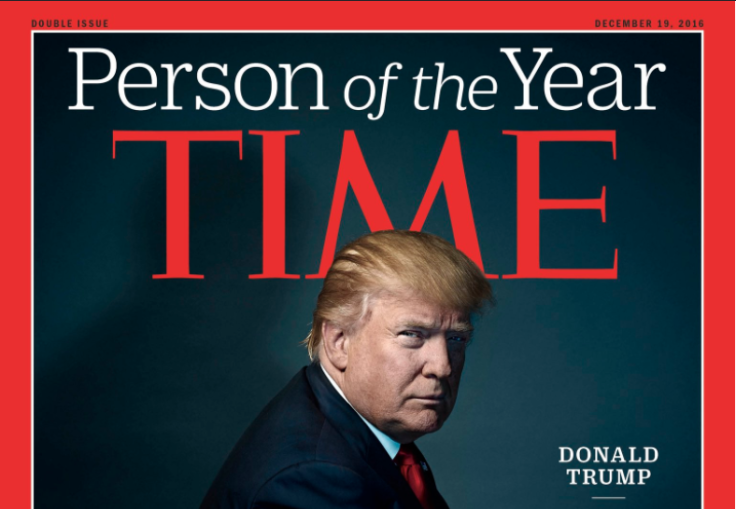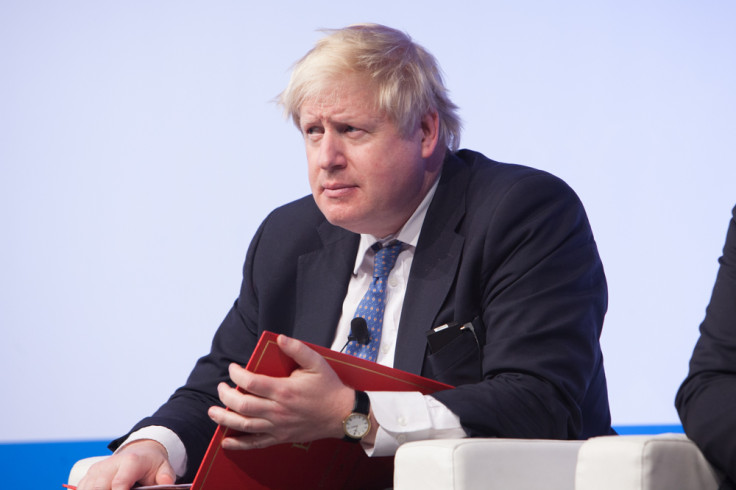'Post-truth' is word of the year - but that doesn't mean we should accept lies from Trump or Brexiteers
My dream for 2017 is that Trump's presidential win turns out to be the most spectacular Fake News yet.

If the criteria is making the news and making the political weather, it is hard to disagree with the choice of Donald Trump as Time magazine's person of the year. He did plenty of both. But on a day we digest the news from Trumpland's team, it is hard to feel anything but anxious about the future with him at the helm of the (for now) most powerful country on earth.
It seems he will have someone who does not believe in climate change and has sought to dismantle environmental protections his entire career as head of the Environmental Protection Agency, gleeful spreaders of fake news and conspiracy theories in charge of national security, and someone who doesn't believe in public school education running the Department of Education.
With Steve Bannon on Trump's team, the alt-right has been normalised. As yet, he still has no Secretary of State, and given the bad start with China and the row over Taiwan, he may be needing one quite soon. What could possibly go wrong with a leader who said climate change was a Chinese hoax? What could go wrong if two leaders like Putin and Trump went man to man, fell out, got the willies out and neither would back down?
As for his campaign slogans: Lock her up. No, he's changed his mind, Hillary is a wonderful woman. Build a wall. Apparently it is going to be a fence now. Drain the swamp. Now the Goldman Sachs guy is in the treasury, several of Trump's billionaire pals are in the Cabinet, and there is a confusing mix of politics and business, including taking his daughter to meetings with PMs so she can tell the world where to buy her bangle.
As this wretched year nears its end, my dream for 2017 is that we in Britain wake up to the disaster that is Brexit and change course, and Trump's win in the States turns out to be the most spectacular example of Fake News yet. Back in realityland we shall look to see how Le Pen fares in France and Wilders in Holland. We shall in the main be praying Angela Merkel survives to win another term. And we will be watching to see who or what can tame Trump.
But what we learned in 2016 was that feeling trumps reason, anger trumps logic, obfuscation trumps detail, and simple messages trump complex arguments. It speaks volumes that the Oxford English Dictionary chose 'post-truth' as its new word of the year. In large part thanks to these populist trends, not only are we heading out of the EU, but someone with no political, diplomatic or military experience, and a proven liar, sexist, racist and narcissist to boot, is about to become president and 'leader of the free world' (sic).
Somehow, Trump managed to turn Hillary Clinton's strengths to weaknesses, and his own flaws and weaknesses into strengths – not in the eyes of most of the political, diplomatic and mainstream media classes - but in the eyes of the people he decided he needed to win. Does anyone here know what Hillary did wrong with her emails? It didn't matter. No fire, lots and lots of smoke.
As for him, for billionaire businessman who won't reveal his taxes, his supporters read smart success story. For Chapter 11 bankruptcies, they saw resilience. For temperamental unpredictable firecracker, they admired someone who tells it like it is and says the things nobody else dare.
Trump was change. He turned Hillary into continuity.
Brexit and Trump both had non-conventional politicians in the lead, pretending they were anti-elitist, seeking out what a brand would call forgotten consumers. It's incredible that a spoilt, rich, inherited wealth billionaire should now seem to represent rust belt Americans, but he made them think he did.

With Trump treating the entire process as a mix between a business deal and a TV show, the media felt compelled to cover him because they knew the public wanted to see him. He got $4.2billion worth of free air time in the US, and media companies the world over need to reflect on their role in his rise. Oh, and guess who is on Question Time again tonight? Nigel Farage. I don't know why he doesn't just take over from David Dimbleby.
Even a few years ago, the Trump strategy wouldn't have worked. But in the reality TV/social media world that is transforming our politics, Trump clearly fathomed its impact better than Hillary, the media, the pollsters, the bookies. In my day, you needed consistency of message. But Trump's inconsistency and unpredictability became part of the appeal. He was like a one man soap opera, the next episode likely to fascinate and shock even more.
In the reality TV age, the reality TV president. In the post-truth world, the post-truth president.
Anger was the key. He needed to express anger as a way of showing he got the anger of people. It became a virtuous circle for him. Say they are angry. Show he is angry. Make them more angry. And make them believe that people who had been around for years wouldn't be able to fix the reasons for their anger. Only he would. A saviour no less.
Twenty-four-hour news and social media have changed journalism out of all recognition. People just move on. Fake news is now a reality in this post-truth world. And as campaigning which disregards facts in favour of emotion has proved successful in the most followed democracy of all, we can expect more of it.
Also, broadcast media has become mainly journalists talking to each other about what other journalists say. Commentators reviewing what they and others have said in the papers. Newsreaders telling you what commentators are saying on Twitter. Media outlets with more space to fill and fewer journalists to fill it with. This is tailor-made for a Trump or a Brexit campaign, storming social media, overwhelming mainstream media.
Most reporting is done from the desk and less and less on the ground. The antennae picking up and understanding social change are less alive. Easy talk is prioritised over news-gathering because it's cheaper – but not necessarily well informed. And in elections, it has spawned an over-reliance on telephone and online polls – now proven unreliable, yet still relied upon to fill the space.
As traditional media has struggled, social networks have grown. But through the lens of these two campaigns, Trump and Brexit, their shortcomings are clear. Facebook is now a planet of misinformation, and Twitter is a planet of abuse and division. Mark Zuckerberg was happy to take credit for two million more people registering to vote, but shunted any responsibility for monetised fake news sites which add to his power and wealth. The power of algorithms, which so few of us even begin, or even try, to understand, has created sealed echo chambers where we are seldom challenged by views we disagree with – further driving polarisation.
So as Trump moved to make the sale, the Brexit comparisons were obvious. A divided country still healing from the scars of the global financial crisis for which working people felt they – and not those who caused the crisis – paid the price. A feeling that the pace of change was too fast and the system needed a kick up the backside to get the message. An anti-establishment, anti-politics and anti-mainstream media mood. And the reason I feel this is a scary time to be alive is because I see in all of the above – particularly with the possibility for the break-up of the EU – echoes of, and parallels with, the 1930s.
As for what Trump will do, is it not incredible that normally we complain if politicians don't do the things they said they would? With Trump, he is getting praise from the media every time he looks like he won't do something he said he would. This is democracy turned upside down, and making the non-democracies and the pseudo-democracies feeling smug and superior. Putin loves 2016.
What happened to being held to account? The red bus liar-in-chief, Boris Johnson, is now Foreign Secretary in the UK, and in interviews and debates the Brexit lies barely seem to get a mention. He says during the campaign we need to vote Brexit to keep the evil Turks out of the EU; then goes to Istanbul in his new role as Britain's top 'diplomat' to say we support Turkish accession to the EU. Post-truth politics indeed.
We pride ourselves on the strength of our democracies. But if this is the way our politics is going, how long before we are not really so much better than the Putin we all claim is worse? There is a great book about Putin's Russia, by Peter Pomerantsev, called 'Nothing is true and anything is possible.' Invade a country, then say you haven't. Poison your enemies on the streets of London. Say you didn't. Bring down planes. Deny it. Interfere in elections abroad. Say it is a CIA lie. How fast has the world changed, that seeming direct Russian interference in the US elections actually created such little fuss?
Trump eyes Vladimir Putin not just with a certain admiration as a strongman leader, but with envy too. He sees a leader who can get more done when he has no real opposition, control of his Parliament, the media, civil society and all the other checks on power.
But if he had campaigned overtly for that kind of power, it is unlikely Trump would have made it. So, just as the Brexiteers had to do, he needed to dress himself up as the crusader for the common man. And now he behaves as though he speaks for the whole world, and the Brexiteers behave as though those who lost the vote must accept all the false arguments of those who won.
Trump has been elected president and Theresa May must develop a relationship with him. But pandering to rudeness and narcissism does not constitute a foreign policy. And those of us who lost the arguments on Brexit should resist the idea that not only do we have to accept defeat, we seemingly have to accept anything the victors throw at us.
Several months on from the EU vote, surely there should by now be a clearer path laid out to this bright shiny new future we are all being asked to believe lies beyond the triggering of Article 50? For Mrs May to be talking of cliff edges and red white and blue Brexit suggests that our government is no clearer about where we are heading.
Brexit won, but the Brextremists alone must not be allowed to dictate what 'Brexit means Brexit' actually means in terms of the laws and practices under which we are governed.
So never stop fighting for what you believe in. Never stop calling out the lies and the excesses. And never stop reminding David Cameron that his referendum was a very very bad idea, the consequences of which will be with us for a long time.
Alastair Campbell is a British journalist, broadcaster, political aide and author, best known for his work as Director of Communications and Strategy for Prime Minister Tony Blair between 1997 and 2003. He is the author of 12 books, the latest of which is Outside Inside, his diaries from 2003-2005.
This post has been edited from this original blog
© Copyright IBTimes 2024. All rights reserved.






